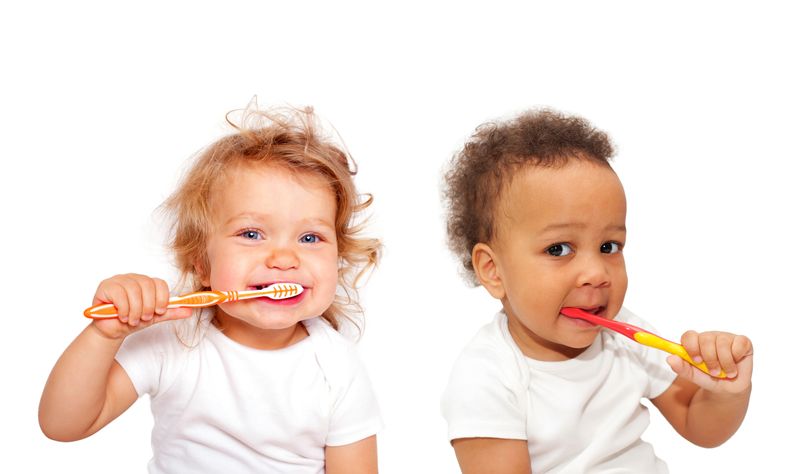Oral Milestones In Your Child’s Development
Sugar Addiction and Children
January 18, 2019Dental Laser Treatments
February 1, 2019
Just as you reach milestones in school, work, and health, your child will do the same. One area that changes quite a bit through growth and development is the mouth. Your child will literally get a pair of teeth, only to shed that pair of teeth later on as they grow. There are oral milestones to watch for as your child grows, which can help you to know if their mouth is healthy and developing correctly. Use this guide to know what to look for!
Oral Health & Children
To have good oral health as an adult, typically you need to start with good oral health as a child. Oral practices and habits start at an early age, and many continue on with us throughout our lifetime. Our mouths and their dental structures are amazing but complicated, and children are most vulnerable to bad oral habits and disease. While they are growing and developing, children pass through many milestones. According to the Center for Disease Control and Prevention, children reach milestones in how they play, learn, speak, act, and move. They learn to tie their shoes, eat with utensils, write their name, and potty train. But children also have oral milestones that are important for them to fulfill, such as learning how to properly care for and clean their teeth. Completing these milestones are essential for healthy teeth, mouths, and gums, and can protect them from serious complications in the future.
Most Important Milestones
From birth to adulthood, there are a few necessary oral milestones that children need to fulfill to ensure a healthy mouth. One of the most exciting moments for new parents is when their child develops their first tooth; this is also the time that parents should begin taking their child to the dentist to care for these newly-formed teeth and protect them from decay. These dental trips are important because, although they eventually fall out, baby teeth can rot and decay, causing problems for the gums and mouth. The eruption of the first baby tooth is the first important oral milestone for a child. As inconsequential as they might seem, baby teeth matter! They hold the place for future permanent teeth, and facilitate speech and nourishment. This is an exciting time for children and parents, and is the first step in developing great oral health.
Once all baby teeth have come in, children go through another milestone in which they begin losing those baby teeth and developing their permanent, adult teeth. Baby teeth typically fall out in the order that they came in, with the two bottom front teeth usually falling out first. By 6 or 7, most children will lose their teeth and will lose their last tooth, the second molar, by 12 or 13. The period of time during which adult teeth begin to appear as baby teeth fall out is called “mixed dentition,” and can cause some problems. Teeth crowding can cause pain and misalignment of permanent teeth, plus children at this age begin to play sports and eat poorly, which puts them at risk for injury to their permanent teeth. Examining your child’s teeth during this period will be important as you seek to prevent any possible complications.
During their teenage years, kids will hit a third milestone: wisdom teeth. Although when and how many wisdom teeth your child develops may vary, visiting a dentist will be important as you monitor their growth. Teenagers’ mouths and jaws normally can’t fit a third set of molars, so it is necessary to have them removed to prevent future pain, infection, and physical effect on adjacent teeth. Additionally, because of the effects of mixed dentition and the movement of teeth in the mouth, many teenagers will get braces put on. Braces help minimize the spaces between teeth and keep permanent teeth in the correct location in the mouth. This can help improve oral health and increase confidence in teenagers as they have a straight, beautiful smile.
How To Help Your Child
Parents can’t predict when their children’s teeth will begin to erupt or when they’ll fall out, but once the teeth are here, they can protect their children’s vulnerable teeth through a few of these tips. As baby teeth begin growing, it’s essential that they are protected as the child’s jaw is developing. Begin by taking your child to the dentist so that they can be evaluated for any abnormalities as soon as their teeth start developing. Make sure to encourage your child to brush and floss each day, and supervise them as they do so, especially very young children. To develop stronger teeth, try including fluoride-rich foods into their diet or supplemental fluoride treatments, such as fluoride-infused toothpaste. Whenever kids begin playing sports during mixed dentition or whenever they get braces, consider having them use a sports mouth guard to protect the teeth, braces, and jaws, to protect against injury. During the teenage years, it also will be important to monitor the eruption of your child’s wisdom teeth and seek a referral to an oral surgeon, if need be. There are many ways to remove wisdom teeth, so if surgery doesn’t seem like the best option, seek out other alternatives. Ensuring that your child has proper oral hygiene, diet, and regularly exercises also can keep their mouth healthy, as well.
What If My Child Hasn’t Hit These Milestones?
What about those children who haven’t reached some of these milestones, or it took them longer to go through the process than normal? As mentioned, every child is different and will have a different rate of growth, including their teeth, which can vary from the “normal.” Just because it might be taking your child longer to develop doesn’t inherently mean that something is wrong or abnormal; kids just develop at different rates! By beginning dental care early, your dentist will be able to help you navigate your child’s oral health in the best way possible and prevent future complications. If you’re wondering how you can start or if your child is currently having oral health problems, call Hardy Pediatric Dentistry & Orthodontics at (720) 887-6003 for a detailed consultation. Make the effort now to help your child through these important milestones!